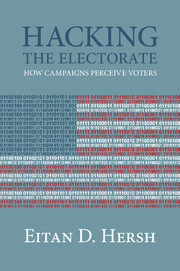Book contents
- Frontmatter
- Contents
- Acknowledgments
- 1 Introduction
- 2 The Perceived Voter Model
- 3 The Policy Roots of Elite Perceptions
- 4 Campaign Perceptions Quantified
- 5 The Perceived Partisan
- 6 The Public Code of Racialized Electioneering
- 7 Persuadable Voters in the Eyes of the Persuaders
- 8 Voters Perceived in Social Networks and Consumer Files
- 9 Conclusion
- Appendices
- Notes
- Bibliography
- Index
3 - The Policy Roots of Elite Perceptions
Published online by Cambridge University Press: 05 July 2015
- Frontmatter
- Contents
- Acknowledgments
- 1 Introduction
- 2 The Perceived Voter Model
- 3 The Policy Roots of Elite Perceptions
- 4 Campaign Perceptions Quantified
- 5 The Perceived Partisan
- 6 The Public Code of Racialized Electioneering
- 7 Persuadable Voters in the Eyes of the Persuaders
- 8 Voters Perceived in Social Networks and Consumer Files
- 9 Conclusion
- Appendices
- Notes
- Bibliography
- Index
Summary
Voter registration records, as well as other public records containing personal information, do not merely happen to be useful for campaigning. The data are useful by design. This chapter demonstrates how public policies about data are purposefully shaped in ways that affect campaigns' strategic communications with voters. Political campaigns are waged in a particular policy context. To understand how political campaigns interact with voters, it is necessary to examine that context.
When investigating campaign perceptions and strategies in contemporary politics, it is striking how reliant campaigns are on public institutions for their data. Parties and vendors receive real-time updates from election authorities about which voters have newly registered, which voters have cast early ballots, and which voters bear key demographic characteristics. They receive a steady stream of data from state and federal authorities that manage lists of licensees and subsidy beneficiaries. They also obtain detailed neighborhood characteristics from the Census Bureau. The thesis of this chapter is that campaigns are able to perceive voters through these resources in part because politicians have designed data laws for this very purpose. Laws about the collection and dissemination of public data are often tailored so that politicians can repurpose the data in service of their campaigns. This repurposing often happens with little public awareness.
From nearly the moment voter registration laws were enacted, the records that compose the voter registration system were co-opted by political parties to help them mobilize their supporters. Other sources of public data have been similarly co-opted by campaigns for electioneering. The decennial Census, meant to count the population for the purpose of allocating congressional seats, now caters not only to private industry by providing detailed information about every neighborhood in the United States but also to campaigns that use these same data to target political messages to segments of voters. Similarly, open-record laws, which allow citizens to request government documents, are co-opted by political campaigns that petition agencies for administrative data in order to facilitate political targeting.
- Type
- Chapter
- Information
- Hacking the ElectorateHow Campaigns Perceive Voters, pp. 45 - 65Publisher: Cambridge University PressPrint publication year: 2015



